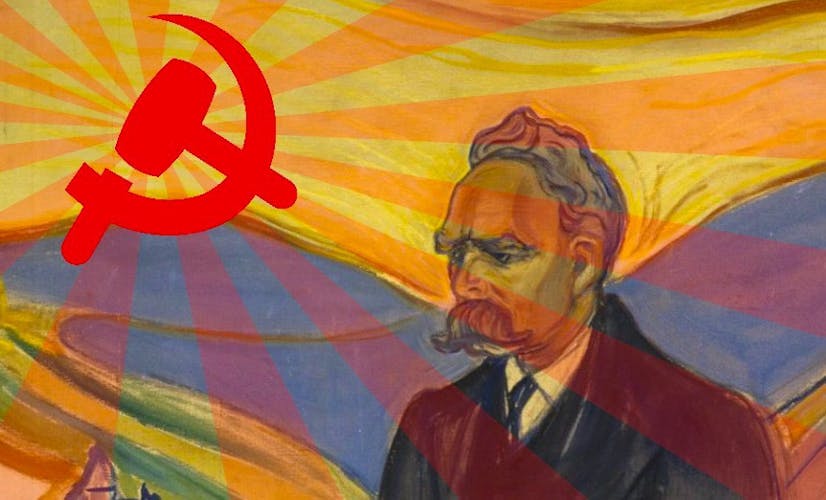The Genealogy of Morals w/ CCK Philosophy/Jonas Čeika (Theory for Dummies Series)
Jago
Sunday, 1st May, 2022
This Wednesday saw prominent leftist philosophy Youtuber CCK Philosophy (Jonas Čeika) discuss the most profound and important texts on the turn of esoteric moralism and existential questionings on the foundations of religion; Friedrich Nietzsche’s On the Genealogy of Morality: A Polemic.
In today’s current context of late capitalist, neoliberal chaos and remerging battle-lines between socialism and barbarism – what can Nietzsche teach us about socialist organising and Marx’s dialectical-materialism? And, more fundamentally – how should we perceive society’s moral universe and, our internal and external place within it?
Jonas laid out the book’s three treatises;
'Good and Evil', 'Good and Bad' – The development of ressentiment and internal (inter-personal frustration) and external (wider social-grouping values/attitudes) perceptions of what is ‘good’ and ‘bad’ in the world is determined by each groups’ perspectives about themselves and contradictory to ‘opposite’ groups. Thus, morality, in this sense, is a value judgment of ourselves (internal), our own grouping and our perceived opponents (external). This means morality and its wider social institutional output (such as a judicial system) is the inversive production of what the ruling class deems good and bad.
'Guilt', 'Bad Conscience', and Related Matters’ – Moving away from the analysis of individual moral concepts, the second treatise examines the socio-historical production of memory or, the conscience. Through the earliest primitive, pre-historic times of humans – survival and processes of living have been reliant on the constant cycle of bargaining, hunting, working and hurting; this seemingly banal process is what has developed society’s ‘contractual-evaluating conceptual paradigm’. Consequently, the production of moral categories occurs – humans’ internal and external justifications for the actions we commit in the name of the ‘ends’.
‘What do ascetic ideals mean?’ – The third treatise is perhaps the ‘meat’ of the text, mapping the notion of ‘altering the direction of ressentiment’, the idea of ‘blaming oneself’ for the ills that face us. This directs Nietzsche’s rejection of teleology – where, much like Marx, action should occur in relation to a greater cause, as opposed to the positivist understanding of action serving its own self. Ultimately, this is Nietzsche’s philosophical turn towards the most ‘noblest form’ of the ascetic ideal; science. Much like Marx, this opens up the space for a ‘will to power’, where people must come together to overcome their internalised (and external) difficulties by challenging the imposed exploitative conditions of capitalism’s resulting conditions of poverty, wars and bitter inter-class rivalries.
Jonas, along with numerous audience contributions, discussed further the implications and philosophical similarities to Marx’s materialist understandings of meta-physical relations and exploitative forces of capitalism. Jonas’s most important contribution came from his explanation of Nietzsche and Marx’s connection at the genealogical level – where, fundamentally, the production (philosophical and social-economic) of a ‘concept’ derives from the entirety of its historical-materialist context. Where things in society don’t exist on their own – the ‘dots of connection’ come from the historical-power relations within everything. Vitally, politics and economics are determined by physical relations of power (or, as Marx describes; class) – opposed to the ‘neutral’ or ‘organic’ idealisation of ‘ideas’. This is, above anything else – the key takeaway, and indeed – the fundamental reason for why Marx (as opposed to other ‘Utopianist’ socialist theories) must remain as socialist’s central theory to understanding capitalism and working peoples place within it.
The talk demonstrated (in a brief stint) why philosophy and critical thinking are not just deeply fascinating intellectual challenges, but, essential to the socialist movement’s organisation and praxis. As Jonas interlinked pre-Marxist socialist philosophies with essentialist and ‘uncritical’ attempts at building ‘progressive’ politics outside of Marxism’s rigorous analysis of material relations (utopianism, post-Marxism or liberalism), philosophy must become the principled tool to the hammer of socialist’s ability to create and understand the continual struggle for a better and more equal world.





